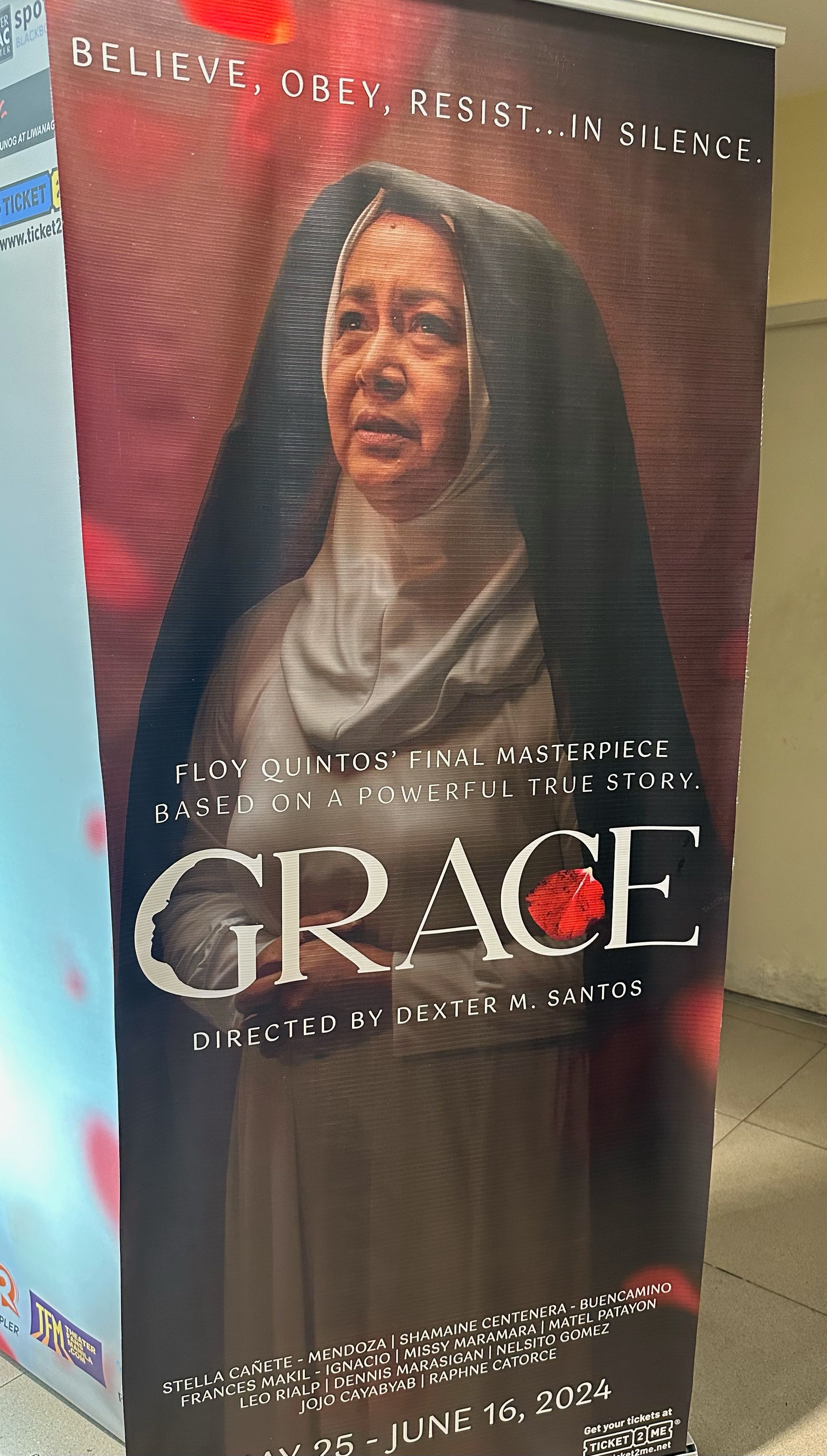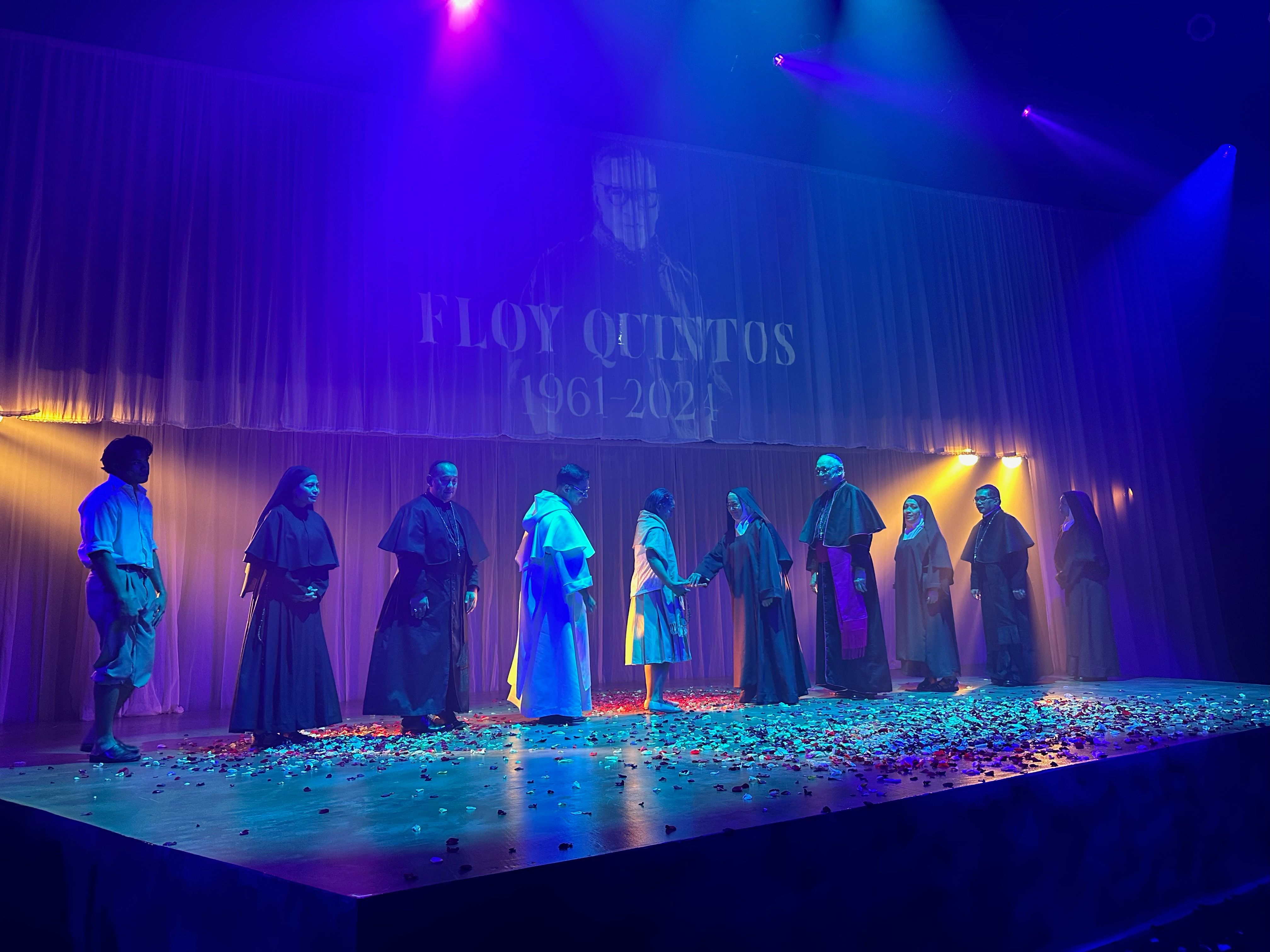When the doubting Thomas takes control: A review of Floy Quintos' 'Grace'
There's a beautiful, poignant moment during the curtain call when Floy is remembered.
At A Glance
- Stage director, playwright, noted events director, and conceptualizer, Floy will be best remembered for writing plays such as Reconciliation Dinner, Angry Christ, and The Kundiman Party.

You have until June 16 to catch Floy Quintos’ last written play, Grace. Directed by close collaborator Dexter M. Santos, the religious drama is being staged at the Power Mac Spotlight Blackbox Theater, and it’s a powerful reminder of what we’ll miss about Floy now that he’s gone. Floy passed away on April 27 of this year at the age of 63.
Stage director, playwright, noted events director, and conceptualizer, Floy will be best remembered for writing plays such as Reconciliation Dinner, Angry Christ, and The Kundiman Party. He would take serious issues, offer socio-political commentary, and possess this special gift of leaving them with humor, compassion, and a deep understanding of the circumstances from which situations would arise.
For Grace, Floy takes on the events occurring in Lipa Carmel, Batangas, from 1948 to 1951. At a Carmelite nunnery, one known for being a contemplative order that goes barefoot and follows a regime of physical hardships, apparitions would occur to Sister Teresita in 1948. As echoed by Mother Prioress Cecilia, rose petals would shower down, and the Virgin Mary, as Mediatrix of All Grace, would appear with messages over a certain number of days. Historically, the Lipa ‘miracle’ captured the imagination of this Catholic country, became a pilgrimage, had PAL even arranging Manila to Lipa flights, and was covered extensively by the media as our version of Lourdes.

Ecclesiastical authorities came down heavily on the Lipa diocese, eventually coming out with the 1951 verdict that it was a hoax. And that’s why there’s not much recall anymore for the incident. Floy presents the various ‘players’ in this chapter of our Church’s history - from the nuns to the bishops, the investigating rector (devil’s advocate), and the Papal Nuncio.
The drama is a searing examination of the Filipino’s version of Catholicism, the politics and hierarchical nature of the Church, the tenuous balancing act of reason, order, and blind faith with obedience on the one hand, and that desire for miracles, zealous belief, and conversion on the other hand. And let’s not forget the ever-present element of lucre, of money via donations, as believers attempt to ‘quantify’ their devotion. They’re all held up to the light by Floy, and to his credit, he doesn’t take sides during the exposition.
It’s a beautifully nuanced drama, and if I had to be critical about its structure, I would comment on how it’s overly dependent on multiple narrators of the various characters speaking to the audience to establish themselves and explain motives. In Kundiman and Reconciliation, the internal drama on the stage would provide this understanding and our ‘getting to know’ them. There’s spoon-feeding to a degree that I found surprising - it was like watching a documentary.

I mention this because in the first act, the most telling reaction I noted from the audience came when the Papal Nuncio (Leo Rialp) was just talking to the UST rector (Nelsito Gomez), and let slip how they were both Europeans at heart, unlike the ‘simplistic’ Filipino playing at being Catholic. Effective and organic, coming from dialogue between characters, as it should be in theater, so I was hoping for more of this - which, thankfully, we do get more of in the second act.
There’s a wonderful ensemble cast at work on this drama. Stella Canete-Mendoza is the enigmatic Sister Teresita, Shamaine Centenera Buencamino is a steely Mother Prioress Cecilia, and Frances Makil Ignacio plays the earthy Mother Agatha. There’s Missy Maramara as Sister Lucia, the doubter with her hidden motives. Arrayed on the side of ‘authority’ is Leo Rialp as the imperious Papal Nuncio, the Bishop of Lipa as portrayed by Jojo Cayabyab, Dennis Marasigan as the Bishop in Manila, and Nelsito Gomez as the investigating Dominican rector from UST. And in the Shakespeare tradition of providing a ‘fool’ for shafts of humor, there’s Guillermo (Raphne Catorce), head of the Carmel Boys.

There’s a beautiful, poignant moment during the curtain call when Floy is remembered.
Grace once again showcases Floy's gift of understanding what makes us so Filipino and yet making it universal. It is the human condition, and he masterfully teases this all out while offering us a slice of history, hysteria (or not), worth, and grace.